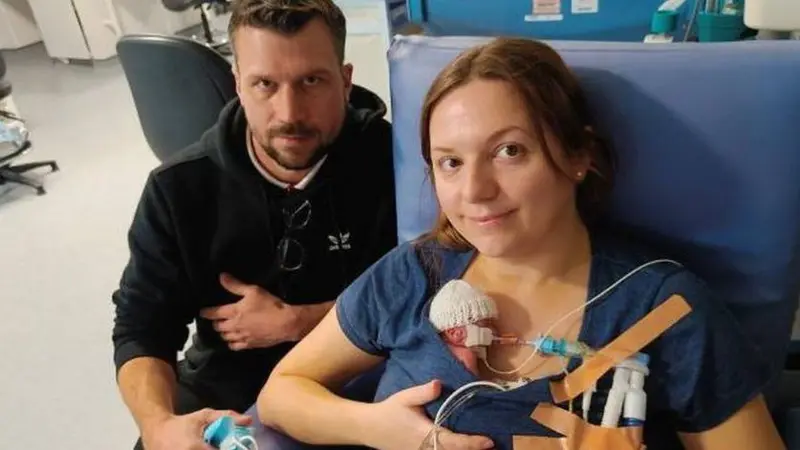
The parents of a baby named Robyn, who was born very tiny at just 11 ounces (328 grams), have finally brought her home after 18 months in the hospital.
Robyn was born five months early in March 2023 at Grange Hospital in Cwmbran, Torfaen, and she still needs special care all the time. Her parents, Chantelle (34) and Daniel (38) from Malpas, Newport, are raising money for her treatment. Chantelle said, “It’s like a dream come true to have Robyn home.”
Robyn was born at just 23 weeks and 2 days and was so tiny that she could fit in the palm of a hand. To keep her organs warm while she grew, she was kept in a sandwich bag.
After six months in the hospital, she spent another seven months in the pediatric intensive care unit at Noah’s Ark Children’s Hospital in Cardiff. She then returned to Grange Hospital until she was finally discharged in September.
Chantelle, who works part-time as an accountant, said, “It’s just so nice to do normal family things… and just all be together under one roof.”
Daniel, a self-employed bricklayer, mentioned that it’s much less chaotic at home now. He has had to cut back on work to focus on taking care of his daughter.

Robyn gets oxygen and nutrition through tubes in her nose and mouth, and her vital signs are watched all the time. She takes 30 doses of medication each day.
Her mom, Chantelle, explained, “She can’t cough, so we have to suction her mouth and nose throughout the day when she needs it.”
Daniel described Robyn as doing well and enjoying the “peace” of being at home. He added that they do a lot of physical therapy and play with her to help her senses.

Chantelle said it was tough to bond with Robyn in the busy hospital ward, with doctors and nurses always coming in and out.
“All you can do is sit next to her and watch,” she explained, “keeping an eye on the numbers on the screen and hoping she will be okay.”
“When Robyn was born, we weren’t sure if she would survive.
“As time went on, she grew bigger and stronger, but she still faced many problems. It became clear that her brain damage would have a big impact on her.”
‘We know nothing is impossible’
“We didn’t learn about her brain damage until about six months after she was born,” Daniel said.
“You have all these plans for how life will be, and then everything changes,” he added.
“But we try to stay positive.
“We know that nothing is impossible for Robyn because she has been told so many times that she wouldn’t be able to do things or even survive, but she keeps proving everyone wrong.
“She’s full of surprises, and I believe she will create her own story.”
A report says that Robert Saleh, the head coach of the Jets, thought about firing Nathaniel Hackett, the team’s offensive coordinator, before he was let go as head coach himself.

Robert Saleh said he was surprised to find out he was fired as the Jets’ head coach on Tuesday. A report shows that he was thinking about firing offensive coordinator Nathaniel Hackett after the team’s loss to the Vikings in Week Five. Todd Downing, the passing game coordinator, was likely going to take Hackett’s place.
However, firing Hackett might have caused tension with quarterback Aaron Rodgers, since Rodgers and Hackett have a close history from their time together in Green Bay. Jets owner Woody Johnson said he didn’t talk to Rodgers about firing Saleh, but he might have considered Rodgers’s opinion if there were problems within the coaching staff.
Now, defensive coordinator Jeff Ulbrich is the interim head coach, and Hackett is still leading the offense, which has scored the same amount of points as last season when Rodgers wasn’t playing.



Leave a Reply